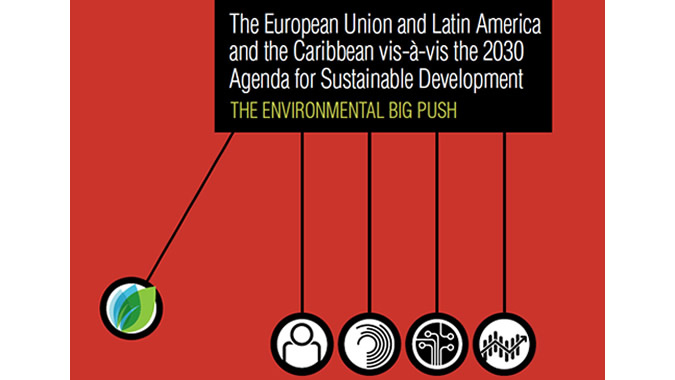Alicia Bárcena Calls on CELAC and the EU to Take Advantage of the Digital Economy, Innovation and the Fight Against Climate Change as Drivers Towards New Development Paths
Work area(s)
In the framework of the Meeting of Foreign Ministers of CELAC and the European Union, which was held in Santo Domingo, ECLAC’s Executive Secretary called for harnessing complementarities among the two regions with a view to complying with the 2030 Agenda.
Latin America and the Caribbean and the European Union should take advantage of their shared values and the existence of strong complementarities to contribute to producing an environmental big push that enables a move towards new development paths, Alicia Bárcena, the Executive Secretary of the Economic Commission for Latin America and the Caribbean (ECLAC), stated today.
The senior United Nations official participated in the Meeting of Foreign Ministers and the XLVIII Meeting of High-Level Officials of the Community of Latin American and Caribbean States (CELAC) and the European Union, which was held in Santo Domingo, the Dominican Republic.
In the framework of the summit, which concluded today, ECLAC’s most senior representative met with the High Representative of the European Union for Foreign Affairs and Security Policy, Federica Mogherini, and with the Director-General for International Cooperation and Development of the European Commission, Stefano Manservisi, with whom she agreed regarding the importance of cooperation between the two regions, particularly in terms of confronting the challenges that predominant global trends have imposed.
“At ECLAC we are proposing new global coalitions and the first step is between Europe and Latin America and the Caribbean. If we unite, we can form a large coalition in the future to expand the economy and achieve the equality and environmental sustainability that we are seeking so intently,” ECLAC’s Executive Secretary said.
Bárcena thanked the Dominican Republic’s Foreign Minister and summit host, Miguel Vargas, for his invitation and warm reception.
In a presentation before the Foreign Ministers of CELAC and the EU, meanwhile, Bárcena unveiled the document The European Union and Latin America and the Caribbean vis-à-vis the 2030 Agenda for Sustainable Development: The environmental big push, produced by ECLAC and the EU-LAC Foundation, with the support of the European Union.
During this event, ECLAC’s Executive Secretary affirmed that Latin America and the Caribbean and the European Union must move towards an investment pattern that favors innovation and structural change while also allowing for economic growth and carbon emissions to be decoupled.
“The two great drivers of innovation and transformation are the fight against climate change, based on the Paris Agreement, and the digital economy. These two major changes are at the heart of the environmental big push that requires better investments, growth along low-carbon paths, and a new kind of habitability in cities. Along with that, we must bet on the circular economy with equality always at the center—which is a value shared with Europe—as well as on full employment and environmental sustainability,” she said.
She also emphasized that the approval of the 2030 Agenda for Sustainable Development and the Paris Agreement, which goes into effect on November 4, poses new challenges that CELAC and the European Union should tackle by renewing their relations through a process that allows for addressing, advancing and implementing the new development paradigm that is starting to emerge.
The document presented today by ECLAC’s Executive Secretary was prepared as a contribution to the discussion by authorities and officials gathered in the Dominican Republic, ahead of the III Summit of Heads of State and Government of CELAC and the European Union, which will take place in Bolivia in 2017.
The report indicates that the complex international scenario—characterized by a distinct recessionary bias, a rise in global inequality and the intensification of the environmental crisis, the acceleration of the technological revolution, the emergence of new actors in the international economic system, and the negotiation of mega-agreements—presents new challenges and opportunities for the countries of CELAC and of the European Union, as well as for relations between the two blocs.
Related content

Latin America and the Caribbean and the European Union Must Move Towards Consumption and Production Levels that are Compatible with Environmental Sustainability
ECLAC and the EU-LAC Foundation will present a new document during the next Meeting of Foreign Ministers of CELAC and the European Union, which will take place in Santo Domingo on October 24-26.
Subregional headquarter(s) and office(s)
Country(ies)
- Latin America and the Caribbean
Contact
Public Information Unit
- prensa@cepal.org
- (56 2) 2210 2040